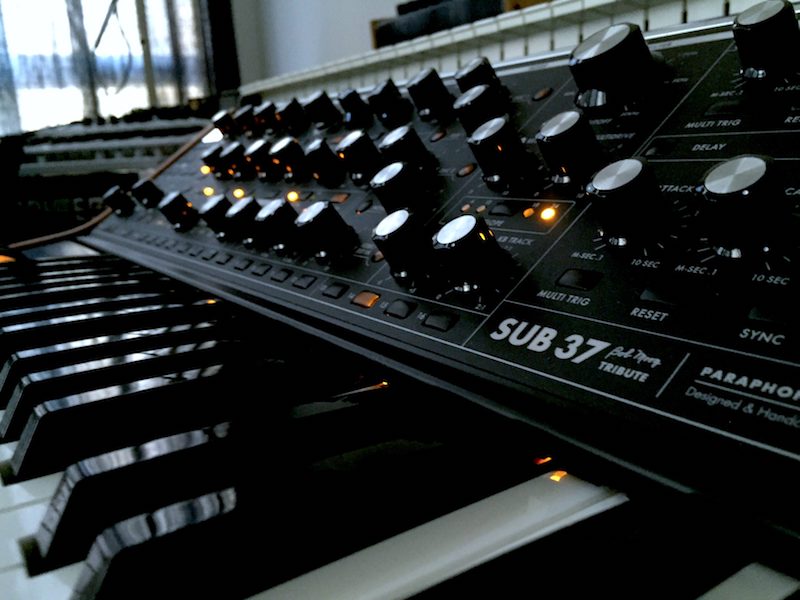My Moog Sub 37 Synthesizer Review

About Moog
Company Details
Based in Trumansburg, New York, Robert Moog's original company was founded as R.A. Moog Co. in 1953.
Through Bob Moog's professional work, Moog Music produced some of the most popular synthesizers of all time.
My Initial Thoughts
Moog Sub 37 is a paraphonic analog synthesizer with 37 velocity-sensitive keys.

It contains two oscillators and a sub oscillator, a white noise generator, a low-pass filter, two high-speed LFOs, and two DAHDSR looping envelopes.
DAHDSR stands for Delay, Attack, Hold, Decay, Sustain, and Release.
You only need one look at this synthesizer to get a feeling of how awesome it is.
This is quite a heavy synthesizer with a solid feel, and you’ll immediately notice the craftsmanship and attention to details that were put into this model.
You can’t judge a synth only by its looks, of course, so let’s take a closer look at what Moog Sub 37 has to offer.
Check the Price on Amazon
- Sub 37 design - all the controls and features...
- Sound engine Evolution - richer low end and...
- MORE MULTIDRIVE - Wider range and dirtier...
Feel, Specifications, Dimensions, and Integrations
The Sub 37 is actually a hybrid, somewhere in between an analog and a digital synth.
The signal path is analog, but it’s controlled y digitally generated modulators and contour generators.
It’s also called “paraphonic” and in this case, it means that the two oscillators can be played independently in real time while they are both sharing the same filter.

The easiest way to describe the sound of the Sub 37 is, well, the “Moog sound”.
It produces a beautiful, rich, analog sound.
I’d describe it as a sound that’s a bit on the darker side, but that doesn’t mean it’s dirty or muffled (if you don’t want it to be).

Basically, almost any sound you programme on it will come out sounding great.
Advanced Features and Performance
On the left side of the synth, there is a panel that house all of the inputs and outputs.
It includes audio in and out, CV inputs, Midi IN/Out, USB, and, of course, the power supply input.
The USB port transmits only MIDI and not audio, but it can also be used to control the synth from a PC via the downloadable Sub 37 software editor.

Above the keyboard, there is a large panel housing all of the controls, and there are a lot of them indeed.
They are logically organized and feel very smooth and solid.
In total, there are 40 knobs and 74 switches.
Since there are so many of them, all of the controls you’ll need to use frequently are laid out on the front panel.
The controls are accompanied by an LCD display which is quite small, but still big enough to serve its purpose.
Pros & Cons of Sub 37
Benefits |
|---|
Incredible high-quality sounds |
The dual oscillators provide great flexibility and freedom of expression |
An impressive arpeggiator with step sequencing functions |
Allows for direct control from a PC/Mac |
Drawbacks |
|---|
Might be too big if you have limited space |
Difficult to clean, additional cleaning supplies are needed to properly wipe |
It has only 37 keys which might feel a bit restrictive for advanced users |
No CV output |
My Final Thoughts
As always, I tried to give you a streamlined overview of the pros and cons of the synthesizer in question.
The thing is, with Moog synthesizers, it’s hard to come up with reasons why you shouldn’t get one.

The paraphonic architecture of Sub 37 produces a unique sound accompanied by extensive modulation possibilities.
The control panel allows you to control the myriad features of this synth as easily as possible.
If you are seriously considering picking up a modern Moog, definitely consider the Sub 37.
Check the Price on Amazon
- Sub 37 design - all the controls and features...
- Sound engine Evolution - richer low end and...
- MORE MULTIDRIVE - Wider range and dirtier...
Want to Learn More?
More Links
More Links
More Links

